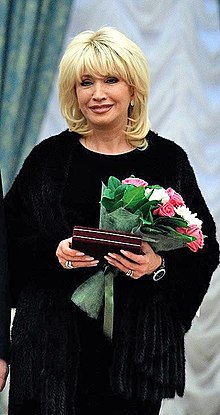Irina Allegrova
| Irina Allegrova | |
|---|---|
 |
|
| Born |
Irina Aleksandrovna Allegrova 20 January 1952 Rostov-on-Don, Soviet Union |
| Occupation | Singer, actress |
| Years active | 1975–present |
| Title | People's Artist of Russia (2010) |
| Website | http://irinaallegrova.ru |
| Musical career | |
| Genres | Pop, dance, synthpop, pop rock, dance-rock |
| Instruments | Vocals |
| Associated acts |
Oscar Feltsman Igor Nikolayev Igor Krutoy Viktor Chaika Mikhail Shufutinsky |
Irina Aleksandrovna Allegrova (Russian: Ирина Александровна Аллегрова; born 20 January 1952) is a Russian singer. People's Artist of Russia (2010)).
Irina Allegrova was born in Rostov-on-Don in 1952. Her Armenian father Alexander Sarkisov took the surname Allegrov as a pseudonym when he was just 17 and Irina was born with this surname (Allegrova). Her Russian mother was Serafima Sosnovskaya. Irina was brought up in a theatrical family with famous people who frequented their house and impressed the young girl. Irina spent her early life in Baku, Azerbaijan where she studied piano and ballet. Irina gave birth to one daughter, Lala, at a young age. She left Lala with her parents and moved to Moscow to become a singer at the age of 22.
In 1985, Irina met Oscar Feltsman, who gave her a chance at a solo career and wrote several songs for her. Then, in 1987 she became soloist in David Tukhmanov's band - Electroclub.
Irina's debut album "My Destined One - Suzheny/Wanderer - Strannik" was written and produced by her neighbor and friend Igor Nikolaev. The album, supported by the single "Wanderer" (1991–1992) became No.1 and stayed No.1 for nearly a full year.
Irina's next album was "Ugonschitsa" (1994–1995), which won a Russian Grammy (Ovatsiya) for Best Pop Female Star. She toured the United States after that album's release.
Irina began to work with Igor Krutoi, changed her hair to her natural brunette, got married, had a grandson, and bought a house on the outskirts of Moscow. Irina and Krutoi released two albums together, "I will disperse the clouds with my hands" and "Un-finished Romance" (1996, 1998).
...
Wikipedia
